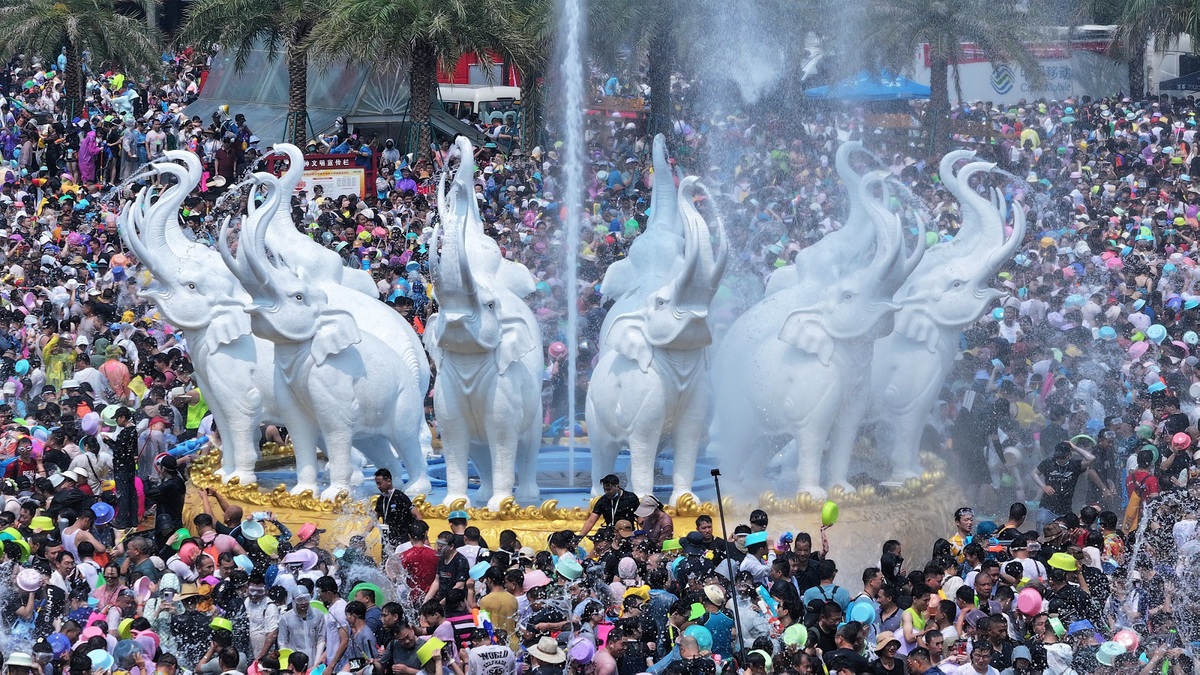Water festival brings fun and tourists to Yunnan


The more water people splash on you, the luckier and happier your life will be. That's the positive message from the water sprinkling festival in Xishuangbanna, in Southwest China's Yunnan province, which has become a strong impetus for tourism growth.
Melissa Baidak, from Russia, was scared at first when people surrounded her and splashed water, but then she joined in and had a good time.
"The happiness reminds me of my childhood," she said.
Melissa, who is in a doctoral program at Beijing Foreign Studies University, tried on an ethnic Dai dress and tasted many specialties and cuisines during her stay in Xishuangbanna Dai autonomous prefecture — where the water sprinkling festival was held.
"The most impressive activities were flying the Kongming lanterns at night and splashing water on other people. It was stunning and romantic to see so many lanterns floating in the air, like twinkling stars," she said.
The water sprinkling festival is one of the most important festivals for the Dai people — an ethnic group mostly living in Xishuangbanna Dai and another autonomous prefecture, Dehong Dai and Jingpo — who recognize the festival as the new year and organize activities like splashing water, releasing Kongming lanterns and dragon boat races.
Other ethnic groups such as the De'ang and Blang who live in the province also celebrate the festival with grand ceremonies. The festival was listed as State-level intangible cultural heritage in 2006.
The four-day water festival started on Friday, while celebrations including some folk shows may last till the end of the month. Travel agencies and industry insiders said the folk activities have generated a tourism boom for the province.
Travel portal Qunar said that flight bookings to Xishuangbanna saw year-on-year growth of 20 percent during the festival, and most of the bookings were made by people from Chengdu, in Sichuan province, Chongqing, and Guangzhou in Guangdong province.
It said that the "earliest bird "booked tickets from Shanghai 100 days before the festival. Room bookings in Xishuangbanna increased by nearly 50 percent year-on-year on the platform.
It's estimated that Jinghong, capital of Xishuangbanna, received 434,700 visits on Friday, the first day of the festival, up 23.7 percent year-on-year. Tourism-related revenue on the day is expected to reach 530 million yuan ($73.2 million), up 45 percent year-on-year, China Central Television reported.
Htike Lwin Ko, a 37-year-old from Myanmar, said his home country also celebrates the water sprinkling festival, which usually lasts four days, and people are allowed a 10-day break.
"We have some customs similar to Xishuangbanna, like releasing Kongming lanterns," he said. "But we usually fly lanterns around October."
A visitor from the United States said he was surprised by the celebration even though he did a lot of research before his trip. He said two elderly women wearing Dai ethnic clothes splashed water on him and he splashed back, and laughter and water intertwined to make them feel like they were best friends, even though they had never met.
Xishuangbanna has tightened market supervision to ensure travelers have a safe and happy stay, and has used the festival as a marketing event to build the prefecture into a world-class tourism destination.
Li Qiang, director of its culture and tourism bureau, said that improper or illegal behaviors such as forcing travelers to consume and price gouging are not allowed. The bureau has also stepped up efforts to crack down on travel agencies' illegal behaviors like changing travel itineraries without customers' permission or ride-hailing drivers refusing to take passengers.
Zhu Jiawei, the prefecture's Party secretary, said the government will take advantage of folk cultures and the prefecture's good environment to develop cross-border, educational and eco-friendly tourism, with the aim of seeing tourism-related revenue exceed 90 billion yuan next year.




